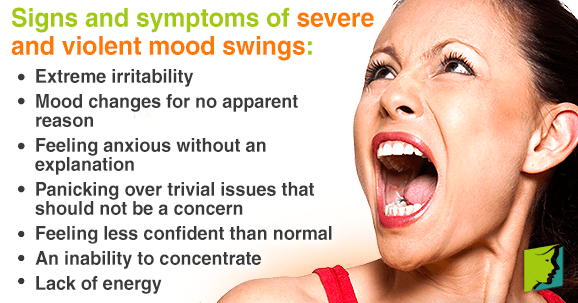Many women report that during menopause, they often experience severe and violent mood swings. Fortunately, there are plenty of treatments available.
What Are the Signs and Symptoms of Severe and Violent Mood Swings?
There are many signs and symptoms of mood swings, and they vary in severity and frequency. It can be difficult to realize that you are experiencing mood swings, but it can be very clear to those around you. Some common signs of mood swings include:
- Extreme irritability
- Sudden changes of emotion (i,e., excitement to anger to depression) for no apparent reason
- Feeling anxious without explanation
- Panicking over trivial issues
- Feeling less confident
- Inability to concentrate
- Lack of energy
Causes of Severe and Violent Mood Swings
There are many causes for mood swings, but among menopausal women, the primary cause is a hormonal imbalance. The hormones estrogen and progesterone are important in the production of the neurotransmitter in serotonin (a chemical that helps regulate mood). During menopause, imbalanced levels of estrogen and progesterone cause serotonin levels to fluctuate, which can cause sudden and drastic mood changes. This effect can be amplified if there is a large amount of stress in your life, for example from careers, children, or elderly parents.
How Can I Manage My Severe and Violent Mood Swings?
There are many treatments for mood swings, depending on the women. Some options include:
Eating healthy. Getting all the essential vitamins and nutrients that your body needs is critical to maintaining stable hormone production. Remember to eat lots of fruits and veggies, complex carbohydrates and omega-3 fatty acids.
Exercising. Maintaing a healthy body is one of the best ways to stabilize and balance the body's hormone levels. Try exercisiong between 2.5-5 hours a week.
De-stressing. Life is stressful, and things happen. This stress can destabilize your hormones, and especially during menopause, cause more anxiety than you might usually experience. Try and do some relaxing things to try and stabilize your body. For example, soaking in warm baths, meditation, walking outside, or yoga are all good ways to relax.
More Information
If you are concerned about your mood swings, consult a doctor. Mood swings are a symptom of a variety of other problems, and may indicate a different type of chemical imbalance in your body.
Click on the following link for more information on treating mood swings.
Sources
- The Health Center.(n.d)."Adult Mood Swings". Retrieved from www.thehealthcenter.info.
- Dr. Love, Susan, and Karen Lindsey. Dr. Susan Love's Menopause and Hormone Book. New York: Three Rivers Press, 2003.
- Amin, Zenab, Turhan Canli, and C. Neill Epperson. "Effects of Estrogen-Serotonin Interactions on Mood and Cognition". Behav Cogn Neurosci Rev 2005; 4; 43.
- Molecular Psychiatry.(n.d)."Estrogen Promotes Gender Difference in Brain's Response to Stress". Retrieved from www.psycheducation.org.




